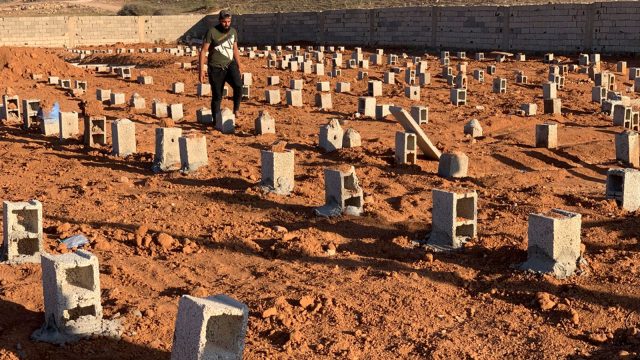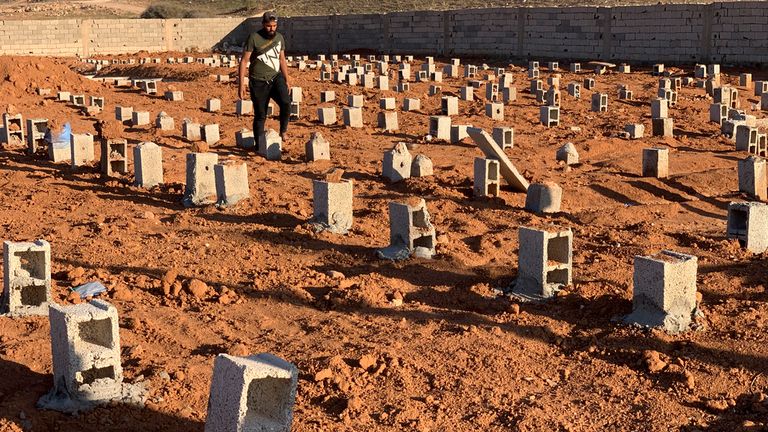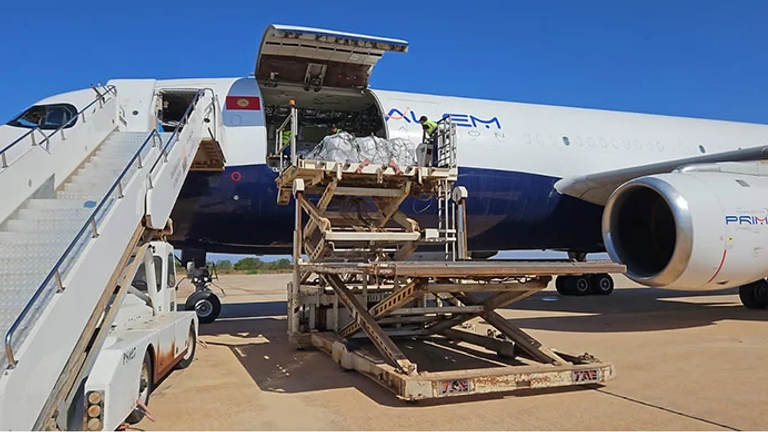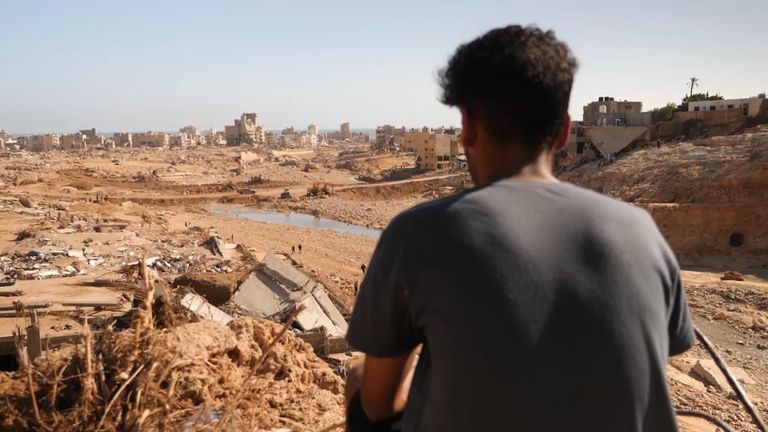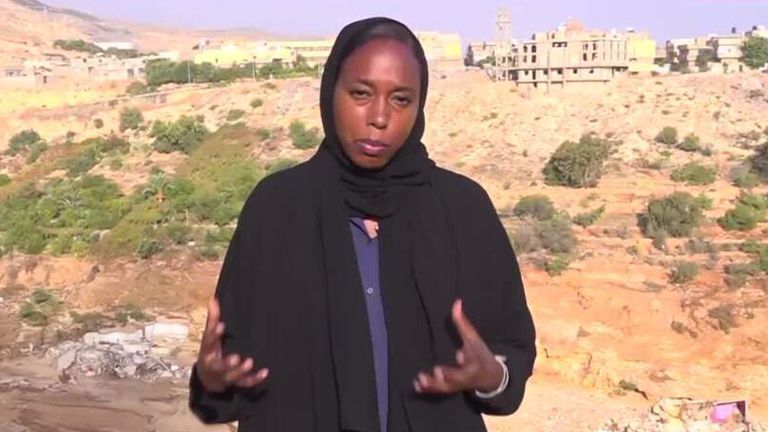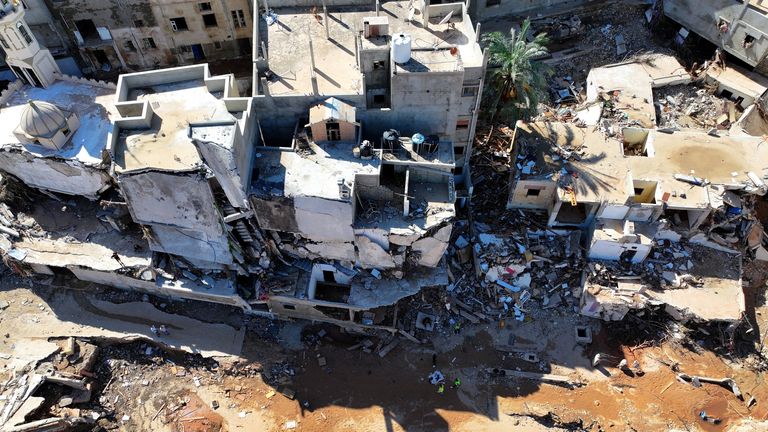A huge package of medical supplies – including body bags – has arrived in flood-hit Libya as aid workers urge authorities to stop burying victims in mass graves.
The World Health Organisation (WHO) said 29 metric tonnes of health supplies – enough to reach almost 250,000 people – had landed in Benghazi.
The supplies, which will go to hospitals and health centres, include essential medicines, trauma and emergency surgery supplies, and medical equipment, as well as body bags for the safe and dignified movement and burial of the dead.
‘Hundreds’ of bodies found on beach – latest updates
The WHO and other aid agencies have urged Libyan authorities to stop burying victims of last Sunday’s flooding in mass graves.
It said such burials could bring long-term mental distress to families, or cause health risks if located near the water.
“This is a disaster of epic proportions,” said Dr Ahmed Zouiten, WHO’s representative in Libya.
It comes as the chief prosecutor of Libya’s eastern government said he would prosecute those responsible for the neglect of two dams in Derna.
The city is struggling to cope with thousands of corpses washing up or decaying under rubble following the disaster.
Meanwhile, the UK’s Foreign, Commonwealth and Development Office (FCDO) said it had increased its aid package to Libya and Morocco – where thousands have died in an earthquake – to £10m.
The money will be used to provide vital provisions including emergency shelter items, portable solar lanterns and water filters.
A specialist emergency medical team led by health and sanitation experts will also be sent over to Libya to provide rapid medical assessments in disaster-affected areas.
According to a UN report, more than 1,000 people have been buried in mass graves since Libya, a nation divided by a decade of conflict and political chaos, was hit by torrential rain that caused two dams to burst.
According to the Libyan Red Crescent, there were 11,300 flooding deaths in Derna as of Thursday.
Another 10,100 people were reported missing, though there was little hope many of them would be found alive, the aid group said.
Bodies “are littering the streets, washing back up on shore and buried under collapsed buildings and debris,” said Bilal Sablouh, regional forensics manager for Africa at the International Committee of the Red Cross.
“In just two hours, one of my colleagues counted over 200 bodies on the beach near Derna,” he said.
Divers are also searching the waters off the Mediterranean coastal city.
‘A fifth of population killed or missing’
Sky News Africa correspondent, Yousra Elbagir, said in an update from Derna on Saturday: “At least 20% of the city’s population have been killed or are missing.
“This is an incredibly tight-knit community. People have lived here for generations.
“Diggers are looking for them [those who are missing], but there just aren’t enough diggers.
“We’ve only seen three or four in this valley. But this is a massive, massive disaster.”
Libya chief prosecutor Al Siddiq Al Sou said on Friday evening that his office had summoned the dam’s administration and the authority responsible for water resources.
He said the investigations are focusing on the funds allocated for the maintenance of the dams, stressing that the office had reports that cracks could be seen in them before the flooding.
“I reassure the citizens that whoever made a mistake, neglected, the prosecution will certainly take firm measures, file a criminal case against him, and put him on trial,” he said.
The number of deaths may increase further, officials warned, due to the spread of waterborne diseases and moving explosives that were swept up when the two dams collapsed and sent a wall of water gushing through the city.
Ibrahim al Arabi, health minister in Libya’s Tripoli-based western government, said he was certain groundwater was polluted with water mixed up with corpses, dead animals, refuse and chemical substances.
“We urge people not to approach the wells in Derna,” he said.
Click to subscribe to the Sky News Daily wherever you get your podcasts
The disaster has brought some rare unity to oil-rich Libya after years of civil war between rival governments in the country’s east and west that are backed by various militia forces and international patrons.
But the opposing governments have struggled to respond, and recovery efforts have been hampered by confusion, difficulty getting aid to the hardest-hit areas, and the destruction of Derna’s infrastructure, including several bridges.
Read more:
Horrifying moment girl’s body found by digger – eyewitness
Before and after pictures show devastation
What caused sheer scale of destruction in flooded city?
The UN has announced $10m (£8.6m) from its Central Emergency Response Fund (CERF), to which the UK is one of the largest donors.
Britain’s minister for the Middle East and North Africa, Lord Tariq Ahmad, said: “It is harrowing to see the loss of life and scenes of devastation in Libya following the floods.
“The UK is committed to supporting the Libyan people during this extremely difficult time.
“We will increase UK funding to the crisis response and deliver crucial life-saving provisions, including shelter, water filters and medical assessments.”

